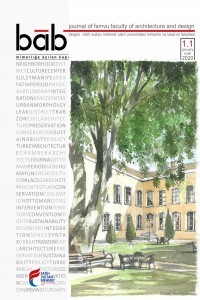Modüler Hücre Yapımın Çok Katlı Binalar Bağlamında İncelenmesi
Modüler yapılar, modüler yapım, çok katlı yapılar, prefabrikasyon, yapım
Investigation of Modular Cell Construction in the Context of Multi-Storey Buildings
Modular buildings, modular construction, multi storey buildings, prefabrication, construction,
___
- Kitap ANDERSON, M. ve ANDERSON, P., 2007. Prefab prototypes: site-specific design for offsite construction. New York: Princeton Architectural Press.
- AYAYDIN, Y. ve KOMAN, İ., 2004. Mimarlar için 12 soruda beton prefabrikasyon. İstanbul: Birmat Matbaası.
- LAWSON, M., OGDEN, R. ve GOODIER, C., 2014. Design in modular construction. Boca Raton, FL: CRC Press.
- ROGAN, A. L., LAWSON, R. M. ve BATES-BRKLJAC, N., 2000. Value and benefits assessment of modular construction. Ascot: The Steel Construction Institute.
- STAIB, G., DÖRRHÖFER, A. ve ROSENTHAL, M., 2008. Components and systems: modular construction: design, structure, new technologies. Basel: Walter de Gruyter.
- Konferansta Bildiri LAWSON, R. M. ve OGDEN, R. G., 2010. Sustainability and process benefits of modular construction. İçinde: BARRETT, P., AMARATUNGA, D., HAIGH, R., KERAMINIYAGE, K. ve PATHIRAGE, C., TG57-Special Track 18th CIB World Building Congress Salford,10-13 Mayıs 2010, Salford: The Lowry. s. 38-52.
- Dergide makale KOMAN, İ. ve GÜR, N. V., 2014. Modüler yapımda güncel yaklaşımlar. Mimarist. (49), s. 40-44.
- LAWSON, R. M., OGDEN, R. G., PEDRESCHI, R. ve OLA, S. P., 2005. Pre-fabricated systems in housing using light steel and modular construction. International Journal of Steel Structures. 5 (5), s. 477-483.
- LAWSON, R. M. ve RICHARDS, J., 2010. Modular design for high-rise buildings. Proceedings of the ICE-Structures and Buildings. 163 (3), s. 151-164.
- TOKGÖZ, H., ve KOÇAK, Y., 2009. Modüler koordinasyonun bina tasarımına uygulanması. Journal of Science and Technology of Dumlupınar University. (20), s. 83-92.
- İnternet kaynağı The Steel Construction Institute, 2008. Best practice in steel construction-residential buildings [çevrimiçi]. Erişim adresi: https://www.infosteel.be/images/publicaties/best-practice/Best-Practice-Residential-EN.pdf/ [Erişim Tarihi 13 Mart 2021].
- Tez SEZER, G. T., 2015. Modüler hücre yapım sistemlerinin çok katlı yapılarda incelenmesi. Yayımlanmamış Yüksek Lisans Tezi. Mimar Sinan Güzel Sanatlar Üniversitesi.
- VELAMATI, S., 2012. Feasibility, benefits and challenges of modular construction in high rise development in the United States: a developer's perspective. Yayımlanmamış Doktora Tezi. Massachusetts Institute of Technology.
- Yayın Aralığı: Yılda 2 Sayı
- Başlangıç: 2020
- Yayıncı: Fatih Sultan Mehmet Vakıf Üniversitesi
Aşık Veysel İçin Mezar Tasarlamak: Kavramsal Düşünme ve Bir Stüdyo Pratiği
Kütahya İlinin Kentleşme Süreci ve Geleneksel Konut Dokusunun Koruma Sorunları
Ali HÜRATA, İbrahim NUMAN, Zeynep AYGEN
Mehmet Selim ÖKTEN, Burcu BALABAN ÖKTEN, Savaş EKİNCİ
Modüler Hücre Yapımın Çok Katlı Binalar Bağlamında İncelenmesi
Modern Mimarlık Meselelerine Romantik Bakışlar: Turgut Cansever
İslam Mimarlığının Kuramlaştırılma Meselesi: Turgut Cansever’in Yaklaşımı
Batılılaşma Ekseninde Mekteb-i Harbiye ve Mimari Dönüşümdeki Yeri
